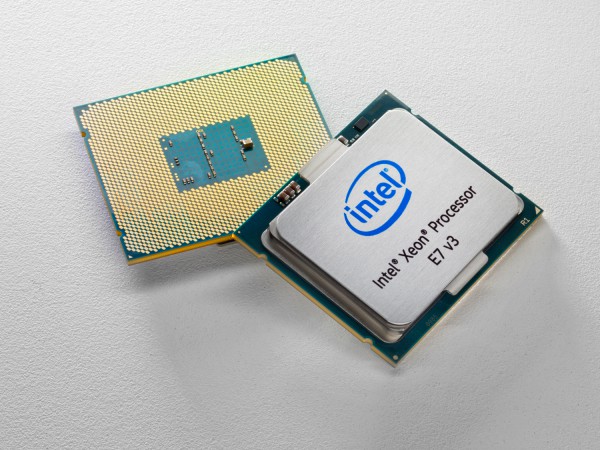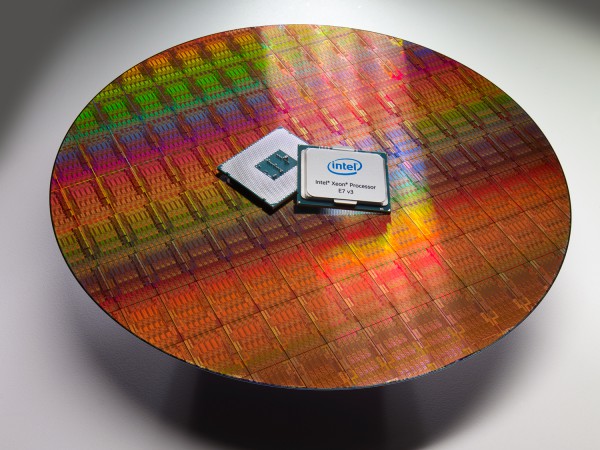Intel releases Xeon E7 v3 processors featuring up to 18 cores

Dual-core? Quad-core? Octa-core? Yesterday's news (I kid, I kid...). Why do I say this? Intel, one of the top processor manufacturers (arguably the best) has released some new Xeon processors with up to 18 dual-threaded cores. Yes, you are reading that correctly -- 18! While Xeon processors are not meant for consumers, they can be used by them, although pricing usually prevents that.
The cost of these new Xeon E7 v3 processors start at $1,224 and go all the way up to $7,175. While this is likely -- OK, definitely -- way too expensive for people like you and I, for the Enterprise, this may be acceptable for workstations and server environments.
Diane Bryant, SVP and GM of the Data Center Group, Intel says, "in the digital services economy, success or failure can depend on how quickly businesses act on insight from vast stores of data. The Intel Xeon processor E7 v3 family is the engine for accelerating business intelligence through real-time analytics, enabling businesses to improve customer satisfaction through more personalized products and services, generate new revenue streams and enhance operational efficiency".
Intel shares the following information on the new chips.
- With 20 new performance world records across a broad range of mission-critical applications, the new processor family achieves a 40 percent average performance improvement compared to the prior generation.
- The processor family delivers up to 6x improvement in business processing application performance for in-memory transactional workloads optimized with the new Intel Transactional Synchronization Extensions (Intel TSX).
- With up to 18 cores, a 20 percent increase in cores compared to the prior generation, and up to 45 megabytes of last-level cache, the processor family can deliver up to 70 percent more decision support analytic sessions per hour.
- Product family delivers up to 10x greater performance per dollar while driving up to an 85 percent lower total cost of ownership compared to alternative RISC architectures by reducing the cost of hardware acquisition and power and cooling.
- The processors support configurations up to 32 sockets with support for the industry's largest memory capacity per socket (8-socket systems are capable of supporting up to 12 terabytes of DDR3 or DDR4 memory technology).
- New security and reliability capabilities, including increased cryptographic performance via the latest Intel Advanced Encryption Standard New Instructions (Intel AES-NI), as well as additional micro-architectural improvements. Intel Run Sure Technology, a unique set of reliability, availability and serviceability (RAS) features for the Intel Xeon processor E7 family, is enhanced with new features designed to further ensure "five nines" availability for mission-critical applications.
- Product family comprises 12 processor models, including multiple segment optimized processors such as two high-frequency models that are designed for a subset of database applications requiring the fastest cores available.
- Starting today, 17 system manufacturers from around the world will begin announcing Intel Xeon processor E7 v3 family-based platforms. These manufacturers include Bull, Cisco, Dell, Fujitsu, Hitachi, HP, Huawei, Inspur, Lenovo, NEC, Oracle, PowerLeade, Quanta, SGI, Sugon, Supermicro and ZTE.

| Processor | Number of Cores | TDP |
| Intel® Xeon® Processor E7-8890 v3 (45M Cache, 2.50 GHz) | 18 | 165 W |
| Intel® Xeon® Processor E7-8880L v3 (45M Cache, 2.00 GHz) | 18 | 115 W |
| Intel® Xeon® Processor E7-8880 v3 (45M Cache, 2.30 GHz) | 18 | 150 W |
| Intel® Xeon® Processor E7-8870 v3 (45M Cache, 2.10 GHz) | 18 | 140 W |
| Intel® Xeon® Processor E7-8867 v3 (45M Cache, 2.50 GHz) | 16 | 165 W |
| Intel® Xeon® Processor E7-8860 v3 (40M Cache, 2.20 GHz) | 16 | 140 W |
| Intel® Xeon® Processor E7-4850 v3 (35M Cache, 2.20 GHz) | 14 | 115 W |
| Intel® Xeon® Processor E7-4830 v3 (30M Cache, 2.10 GHz) | 12 | 115 W |
| Intel® Xeon® Processor E7-4820 v3 (25M Cache, 1.90 GHz) | 10 | 115 W |
| Intel® Xeon® Processor E7-8891 v3 (45M Cache, 2.80 GHz) | 10 | 165 W |
| Intel® Xeon® Processor E7-4809 v3 (20M Cache, 2.00 GHz) | 8 | 115 W |
| Intel® Xeon® Processor E7-8893 v3 (45M Cache, 3.20 GHz) | 4 | 140 W |
So, will your next gaming machine be powered by an 18 core Xeon? Probably not (unless you are a maniac like Barnacules!). Hopefully 18 core chips will trickle down to consumers in the future, though.
Keep in mind the focus of these processors -- business. IT managers may be hesitant to spend the big bucks on such expensive chips, but depending on the business needs, it may be worth it. Time is money and if you can get results quicker, it may be a valuable investment.
Do you work in IT in a decision-making role? Will you be taking advantage of Xeon E7 v3 processors? Tell me in the comments.
